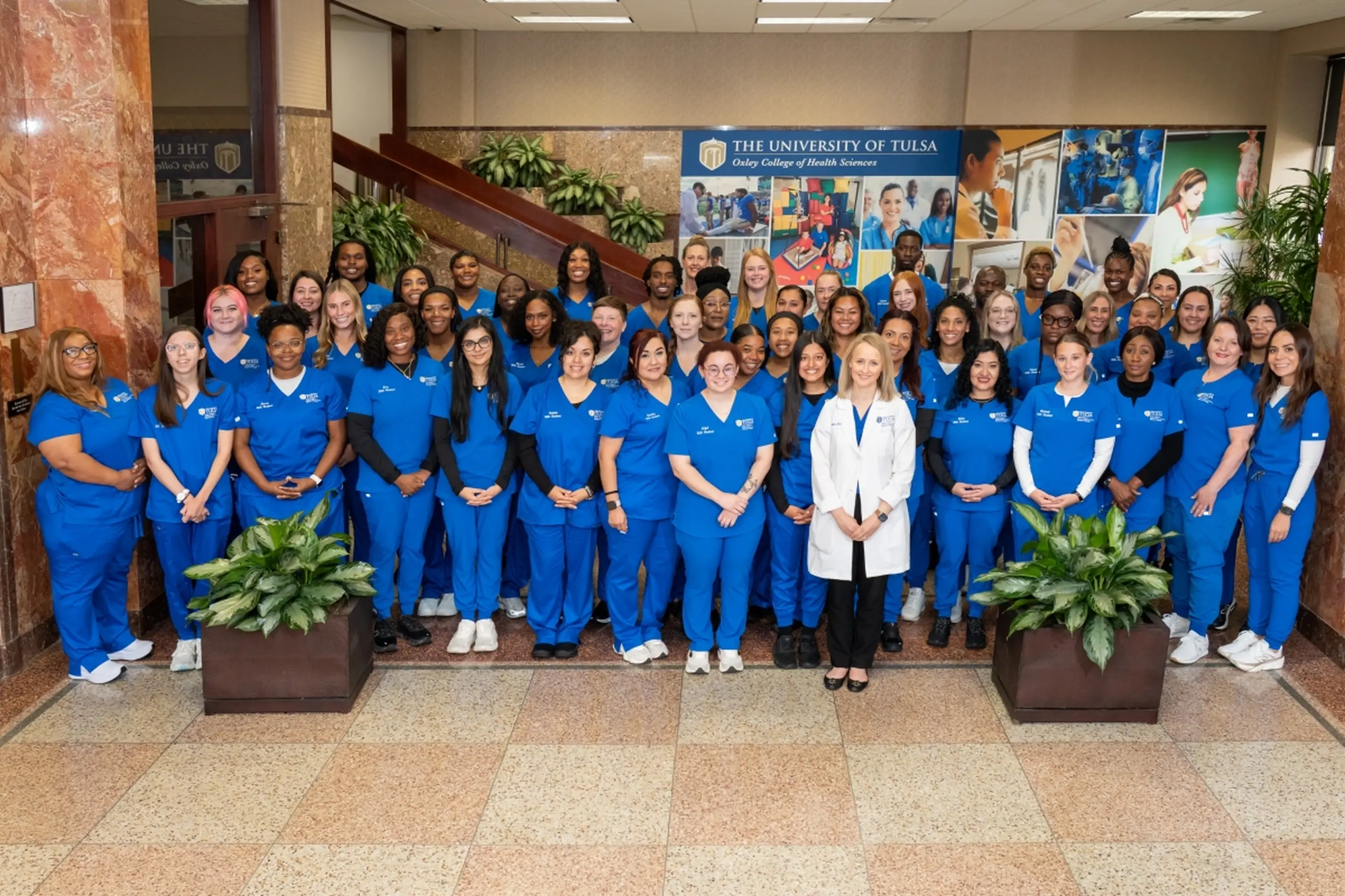Why Dr. Tamara Hryshchuk Chose Nursing, and How She Inspires Her Students
Written by:
University of Tulsa
• Nov 4, 2025

As a first-generation college student, Tamara Hryshchuk remembers trying to find her path through higher education. She began her undergraduate studies knowing she wanted to study a science-related field, but not much else. Then, she met a compassionate nurse whose care ultimately inspired her to change her major and pursue nursing.
“That experience impacted me in such a way that I wanted to be like her, give back to other people and communities, and show people who are struggling the same compassion she showed me,” she recalled. “That launched me into nursing.”
Now, Hryshchuk, who holds a Doctor of Nursing Practice (DNP), serves as director of the Accelerated Bachelor of Science in Nursing (ABSN) and Registered Nurse to Bachelor of Science in Nursing (RN to BSN) programs at The University of Tulsa. She teaches courses including On-Campus Skills Bootcamp, Nursing Care of the Family, Introduction to Applied Health Care Research, and Nursing Science. Her favorite part of teaching the nursing science course is seeing students come full circle, from meeting them in the On-Campus Skills Bootcamp course as nervous and timid new nursing students, to later seeing them in the Nursing Science course after completing their practicum rotations, where they have grown into confident and capable future nurses.
A Background in Neonatal Intensive Care and a Love of Storytelling
Hryshchuk has an in-depth background in bedside nursing, including 17 years in the Neonatal Intensive Care Unit (NICU). During her time working in neonatal intensive care, Hryshchuk was able to support families during difficult times and implement the same compassion she received from the nurse who inspired her to pursue the profession.
“The NICU can be a very scary place. Most parents do not ever think their newborn or premature baby will end up there. While nursing skills in the NICU are important to ensure babies are well cared for, the family needs a nurse who is present, anticipates their needs, and builds trusting relationships. I was challenged to practice these qualities every shift. Looking back, I think I impacted a lot of families during my time in the NICU.”
Although she doesn’t focus on neonatal care in her current online teaching, Hryshchuk uses what she learned about compassion in the NICU to guide her teaching strategies. When teaching the On-Campus Skills Bootcamp, Applied Health Care Research, and Nursing Science courses, she relies on one of her favorite teaching aids: storytelling.
“Whether in a face-to-face classroom or a virtual environment, I love to engage students to share stories from their clinical experiences to help make connections from their textbooks to real-world practice. In the online setting, I’ve found that when one student begins to tell a story, it often inspires others to recall similar experiences — sparking meaningful discussions and ‘aha’ moments that bring the material to life. These exchanges create an engaging learning community where students learn not only from the curriculum but also from one another’s experiences. Throughout these discussions, I guide them in making those critical connections between theory and practice.”
Balancing Challenges and Teaching Compassion in Nursing
For Hryshchuk, pursuing higher education meant balancing academics and the demands of raising a family. Early in her career, she realized that she needed to strengthen her leadership skills to be an effective leader, so she pursued her graduate degree from Southern Nazarene University before earning her DNP from Bradley University, all while raising children.
“I ultimately went on to get my doctorate in leadership because I found myself in a unique situation when I transitioned from bedside nursing practice to working in academia. I felt like I needed additional leadership skills to effectively engage with students and lead an academic program,” she said. “So I just kept going. I did it with limited resources and not a lot of help, so I know it’s doable [for my students].”
Her experience allows her to encourage students who are also juggling life responsibilities by reminding them that success is achievable, even when they face challenges and barriers. “As the ABSN Program Director, my passion is to be every student’s cheerleader and see them over the finish line as they pursue their degrees,” she says.
The University of Tulsa Advantage
After completing their coursework, graduates of TU’s ABSN program pursue roles across a wide range of nursing careers. Hryshchuk’s students have gone into oncology, pediatrics, and other nursing specialties.
“They all have very unique journeys and paths that they’re on,” she said, adding that the ongoing nursing shortage gives her program newfound urgency. “To know that we are impacting different communities is one of the beautiful things about our program. Most TU students have secured careers before graduation. They’ve already interviewed and accepted a job. They’re just waiting to graduate and pass the NCLEX.”
TU’s students benefit from gaining an education from an elite private university — something Hryshchuk says is the gold standard for graduates. “As a nurse who has worked out in the community, when we see TU graduates, they stand out from other nursing graduates because of that high level of professionalism that’s expected from them when they leave the program,” she said. “So not only are they academically and clinically inclined, but they are just great people overall.”
“A prospective student who wants to be recognized in the community as being an elite professional for the profession of nursing — that is what The University of Tulsa can provide that other schools may not,” she said.
Accelerate Your Career in Nursing With an ABSN
TU’s online ABSN program equips students with the skills, confidence, and professionalism to thrive in today’s demanding health care environment. With high first-time NCLEX pass rates and students securing job offers before graduation, TU provides a proven path into a rewarding career.
Led by esteemed faculty members such as Hryshchuk, the program prepares graduates for challenging and rewarding careers in pediatrics, emergency care, and other in-demand fields. Though the program is rigorous, Hryshchuk says it covers the same information found in a traditional four-year degree program, with the added benefit that students can choose when they study or do homework. With TU’s approach to virtual learning, the ABSN program fosters a strong community through clinical cohorts and bootcamps that help students form lasting connections.
“When they come to bootcamp, they don’t necessarily know each other, but when they leave bootcamp, they’ve all made friends, and they are going to continue the program together. So if they live in Dallas, they know who’s in Dallas,” she said.
Hryshchuk’s own journey began with the compassion of a single nurse, and now she guides students through the same kind of transformative experiences. Learn directly from compassionate and knowledgeable professors such as Hryshchuk by applying to TU’s ABSN program today.
Recommended Readings
What Are the ABSN Admission Requirements?
Preparing for Success in Your Nursing Clinicals
The Differences Between an LPN and an RN Explained
Sources:


